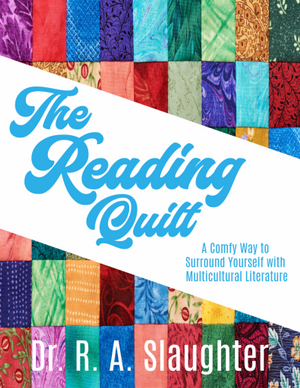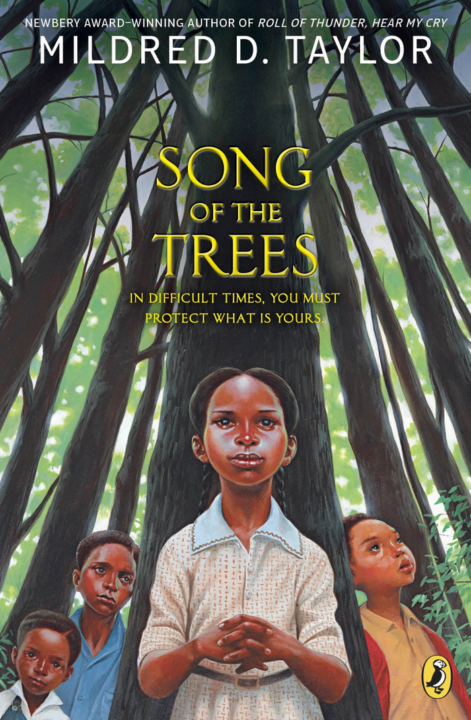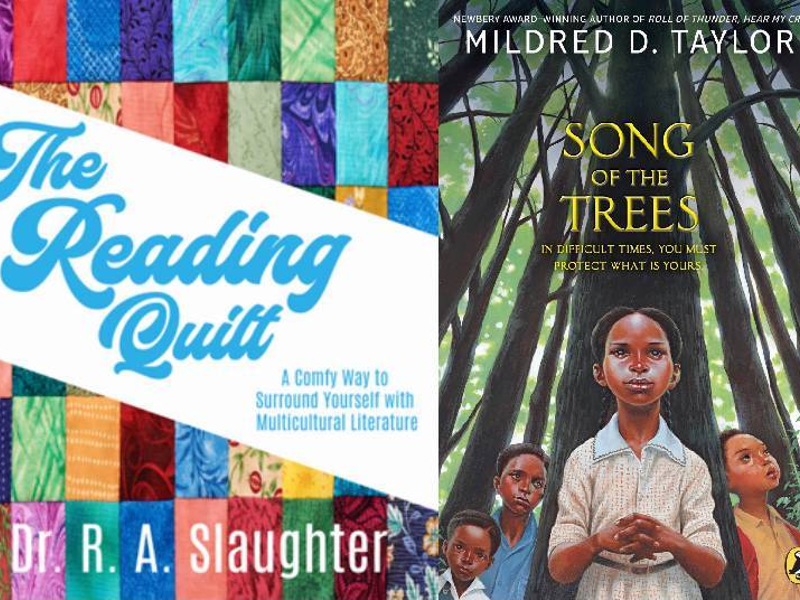Often it is hard to talk to children about sad or devastating events, especially those that happened in American history. If you have children, then you know that Preschoolers especially have the tendency to worry about things they cannot control. So, it makes sense that adults want to shield young minds from depressing facts. Perhaps that is why, typically, American History is taught in the upper grades, the earliest being 7th. However, there are some amazing writers who incorporate historical elements in their fictional children’s books making the information easier for children to understand.

Each month “The Reading Quilt” provides a short review of a book that a teacher may use to spark conversations about culture and race, along with a learning activity that may help students understand human behavior. Using the acronym Q.U.I.L.T., Slaughter offers readers information about the Quality of writing, Universal theme, and Imaginative plot, as well as a mini-Lesson plan, and Talking points that stem from the book’s premise. This month, a middle grade literature book, which vividly illustrates the Logan family’s trauma, is featured.
In less than fifty pages, Mildred Taylor introduces us to several members of the Logan family including a couple of plucky kids determined to protect the family’s treasured land. With the help of Jerry Pinkney’s stunning pencil illustrations, the reader is privy to each family member’s heartfelt joy and pain. Late Jerry Pinkney, a Philadelphia native who died in 2021, captures the spirit of each character’s soul with artistic skill.
Mildred Taylor

Mildred Taylor, Image Source: Google
Mildred Taylor was born in 1943, after the Great Depression, but she grew up hearing stories about the fall of the stock market and other important historical events. Her parents Wilbert and Deletha Taylor raised Mildred in Ohio, but made sure their Mississippi roots and family history never died. A point of family pride was her great-grandfather’s modest home built in the late 1800’s. It was this house that inspired Mildred to write stories of courage and resilience featuring the Logans. Written in 1975, Song of the Trees (The Dial Press) is the first in a series of books about this incredible family. A tight knit family, Mildred calls her mother “the quiet, lovely one, who urged perseverance.” Her father is “strong, steadfast one, who wove the tales of history.”
In 1974, Mildred wrote this letter, “This book is based on a true story, one that actually happened in my family. As a small child, I often listened to my father recount his adventures growing up in rural Mississippi during the Depression. His vivid descriptions of the giant trees, the coming of the lumbermen, and the events that followed made me feel that I too was present. I hope my readers will be as moved by the story as I was.”

Quality: Song of the Trees opens with Taylor’s impeccable writing. As is her knack, she paints a setting with words. In the first scene, Big Ma, Cassie’s maternal grandmother, is running her home like a gentle dragon. As Cassie playfully prepares for school, she falls into lollygagging since her attention is captured by the majestic forest of trees towering over lush stalks of corn just outside her bedroom window. The pale light of a kerosine lamp captures the movement of the other children. The dimly lit room illuminates the pudgy outline of two boys Stacey and Christopher-John who had devoured (in the middle of the night) cornbread earmarked for the day’s breakfast. Certainly, if you want a break from modern day reality, Mildred offers you a warm place near the iron-bellied stove, a hot bowl of clabber milk, and maybe a warm slice of bread with butter. Proving the book’s quality, Song of the Trees won the Coretta Scott King Author Honor Award 1976. Presented to “African American authors and illustrators of books for children and young adults that demonstrate an appreciation of African American culture and universal human values,” the book made a significant impact on the genre of multicultural literature.
Universal Theme: In a 2006 interview written by Nancy J. Johnson and Cyndi Giorgis, Mildred reveals the motivation behind her inspirational stories. “I write about history because I was very affected by it as a child. When I was in school, many people did not know about the true history of Black people in America. Both my mother’s and father’s families owned land. They’d had land since the 1800s. I wanted to tell the truth about what life was like before the civil rights movement.” It is this truth that Taylor and Pinkney bring to life through words and sketch art to illustrate the theme of resilience and fortitude. Ultimately, the Logan family shows us that standing up to a bully will help you keep your self-respect and dignity.
Imaginative Story: For Blacks, life before the Civil Rights Movement was arduous. Black people were viewed as less than human, and subjected to savage cruelty at the hand of White supremacists. In Song of the Trees, Mildred gives us a glimpse of a family led by a strong-willed Black man who stood up in the face of disrespect.
Lesson Plan: Mildred Taylor offers readers a story of a family that struggles against a lumber company who planned to trick the Logan matriarch in giving up valuable land. But Papa puts an end to the nefarious company declaring that he would rather blow up his land than to let the White men disrespect him and the land. This novella would be a great addition to a lesson plan about life for Black people before the Civil Rights Movement. Additionally, there is a lot to learn about the history of Black land ownership.
Talking Points: Talking about Black land ownership may open the door to other topics like Black farmers of the 21st century, Black homeownership, and the racial economic gap.

Dr. R. A. Slaughter’s (Doc) textbooks Turning the Page: The Ultimate Guide for Teachers to Multicultural Literature, and Turning the Page: A Guide to Securing Multicultural Literature for Schools, both published by Rowman & Littlefield and available in all bookstores, have brought Doc global recognition. For more information, log onto drrachelslaughter.info, or email LiteracyUniversity@gmail.com





